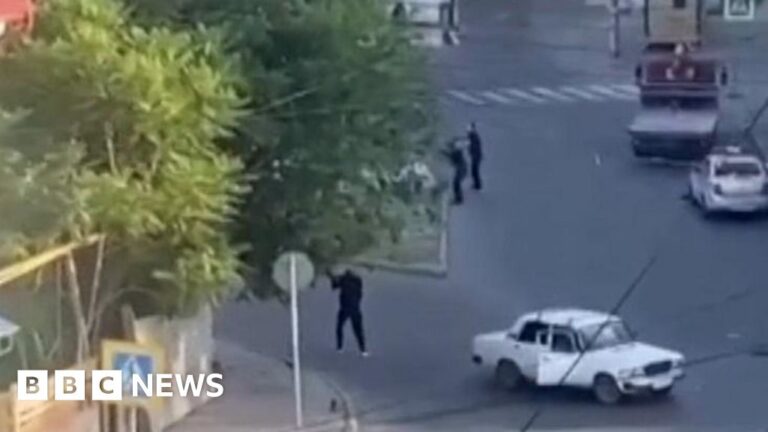Attacks on police stations, churches and a synagogue in Russia’s North Caucasus republic of Dagestan have left 19 police officers and several civilians dead. Six armed men were also killed.
At least sixteen injured people were taken to hospital.
Three days of mourning have been declared in Dagestan, a predominantly Muslim republic in southern Russia neighboring Chechnya.
The apparently coordinated attacks targeted the towns of Derbent and Makhachkala on the Orthodox holiday of Pentecost, and an Orthodox priest was killed.
He was later identified by the head of the Republic of Dagestan, Sergei Melikov, as Father Nikolai Kotelnikov, who had served in Derbent for over 40 years.
Footage posted on social media showed people dressed in dark clothing shooting at police cars, before a convoy of emergency service vehicles arrived at the scene.
In Derbent, the seat of an ancient Jewish community, gunmen attacked a synagogue and a church, which were then set on fire.
Dagestan has been the scene of Islamist attacks in the past.
Although the attackers have not been officially identified, Russian media widely reported that among the gunmen were two sons of the head of the Sergokalinsky district near Makhachkala, Magomed Omarov, Osman and Adil. Mr. Omarov was arrested by the police.
However, in a video posted on Telegram, the head of the republic, Sergei Melikov, suggested that Ukraine had been involved in the attack and that Dagestan was now directly involved in Russia’s war in Ukraine.
“We understand who is behind the organization of the terrorist attacks and what goal they were pursuing,” he said.
The head of the Russian Duma’s international affairs committee, Leonid Slutsky, made similar claims, saying the attacks in Dagestan and a missile strike that killed four people in Russian-occupied Sevastopol “could not be a coincidence”.
“These tragic events, I am sure, were orchestrated from abroad and are aimed at sowing panic and dividing the Russian people,” Mr. Slutsky said.
But a prominent Russian nationalist in occupied Ukraine, Dmitry Rogozin, warned that if every attack was blamed on the “machinations of Ukraine and NATO, this pink haze would lead us into big problems.”
An attack on the location of Crocus Town Hall The attack near Moscow in March, which left 147 dead, was blamed by Russian authorities on Ukraine and the West, even though the Islamic State group claimed responsibility.
Kremlin spokesman Dmitry Peskov said Russian President Vladimir Putin offered condolences to those who lost loved ones in the attacks on Crimea and Dagestan.
Russian news agencies reported Monday morning that the anti-terrorist operation launched after the attacks was now over.
Between 2007 and 2017, a jihadist organization called the Caucasus Emirate, then the Caucasus Islamic Emirate, carried out attacks in Dagestan and the neighboring Russian republics of Chechnya, Ingushetia, and Kabardino-Balkaria.
After the attack on Crocus City Hall in Moscow, President Vladimir Putin insisted that “Russia cannot be the target of terrorist attacks by Islamic fundamentalists” because it “demonstrates a unique example of inter-religious harmony and inter-religious and inter-ethnic unity.
However, three months ago, Russia’s internal security service, the FSB, announced that it had foiled an ISIS plot to attack a Moscow synagogue.


